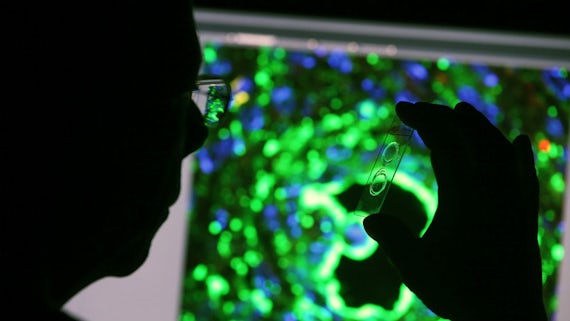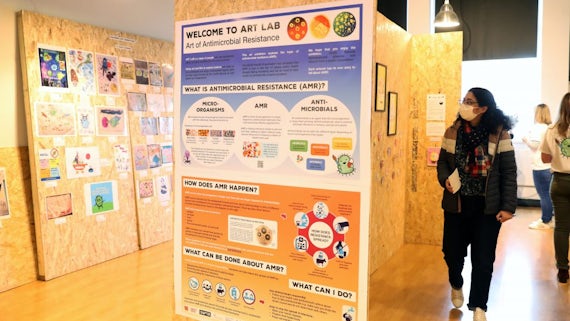
Fighting antimicrobial resistance with art
Using the arts and science to raise public awareness to combat antimicrobial resistance.
Antimicrobial resistance (AMR) is now recognised as one of the top 10 threats facing humanity by the World Health Organisation. Combating antimicrobial resistance is a major challenge facing global health which needs a combined effort from many different sectors including the general public.
‘ART LAB: Art of antimicrobial resistance’ used a blend of arts and science events to uniquely demonstrate how every one of us can play a part in decreasing AMR by using antimicrobials responsibly.
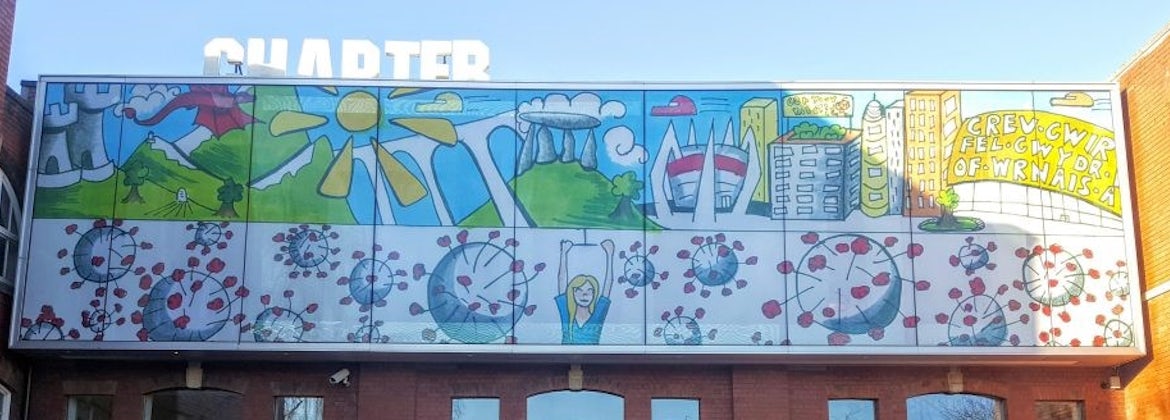
The ART LAB event and exhibition was held at Chapter Arts Centre as part of the Cardiff Festival of Science 2022.
When the drugs don’t work
Microorganisms are tiny living things that are all around us and include bacteria, viruses, fungi, and parasites.
The majority are not harmful to us, and many are beneficial – we have them in our gut and they help with digesting food – but a small number of microorganisms are harmful and can cause infections that make us ill.
AMR happens when microorganisms change over time and stop responding to antimicrobial agents that have traditionally been used to treat infections in humans, animals and plants. Rapidly evolving resistance to antimicrobials makes infections harder to treat, increasing the spread of disease, severe illness and even death. AMR is a complex problem with many interconnecting factors that ultimately affects us all.
Antimicrobial resistant microbes can be found everywhere – in people, animals, food, plants and in the environment (water, air and soil). They can spread from person to person or between people and animals, including from food of animal origin.
AMR occurs naturally but the widespread misuse and overuse of antimicrobials has greatly contributed to its acceleration and global spread.
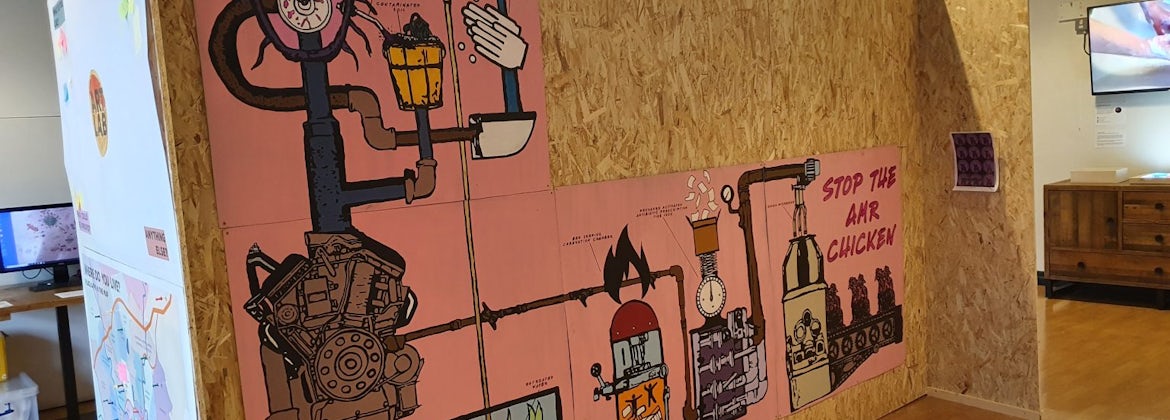
An artwork by Drew Copus inspired by the process of AMR. The exhibition involved commissioned artworks as well as art from members of the public.
ART LAB: Art of Antimicrobial Resistance
Understanding how antimicrobials work, how resistance happens, and what actions drive resistance, enables everyone to play a role in decreasing AMR.
This project, led by our School of Biosciences, sought to address this by using blended arts and science events on the topic of AMR, developed through collaboration between our staff and researchers, the Creative Cardiff Network and creative professionals. The project aimed to increase awareness of AMR and reach people who might otherwise not engage with more traditional Science Technology Engineering and Maths (STEM) activities.
The ART LAB event was held at Chapter Arts Centre in Cardiff as part of the Cardiff Science Festival 2022, and comprised a screening of the documentary film ‘RESISTANCE’ followed by a panel discussion, and an AMR-themed art exhibition that was open to the public for the duration of the festival.
The film panel discussion included Becky Holmes, Institute of Physics Wales, Professor Eshwar Mahenthiralingam, Cardiff University School of Bioscience and Professor Kerry Hood, Cardiff University Centre for Trials Research. The art exhibition showcased artworks commissioned from creative professionals through the Creative Cardiff Network, as well as entries to a public art competition promoted in community hubs, arts centres, schools, shops, and cafes across Cardiff, as well as throughout the university and via social media .
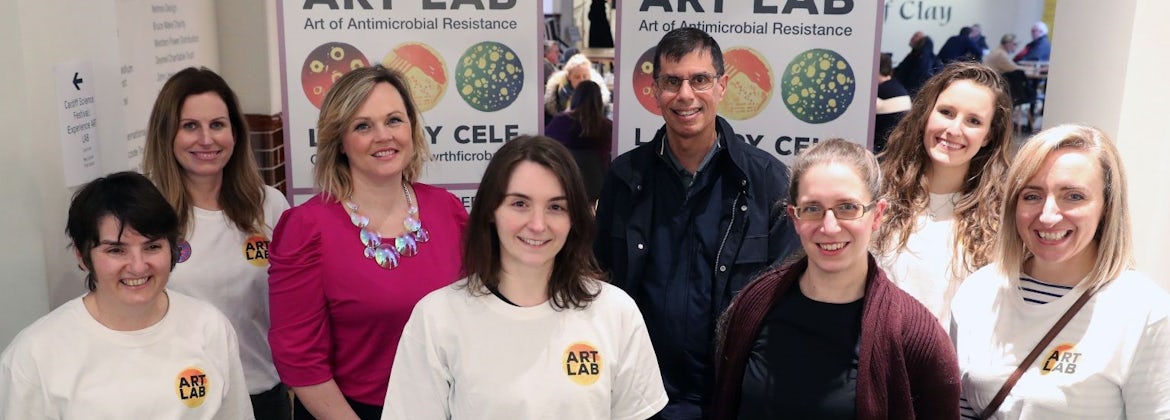
Some of the ART LAB team: (left to right) Fiona Gagg, Laura Rushton, Becky Holmes, Beky Weiser, Eshwar Mahenthiralingam, Luiza Patorski, Naomi Hughes, Vicki Ball.
Improving awareness of AMR
This project succeeded in reaching children, adults, creative professionals, and communities that don’t often participate in more traditional STEM public engagement activities to increase their understanding of AMR and promote appropriate use of antimicrobials.
Project lead, Dr Rebecca Weiser of the School of Biosciences said, “Although we cannot track long-term changes in behaviour relating to appropriate use of antimicrobials, it is clear that our project improved awareness of AMR in people of different age groups both with and without science/arts backgrounds. The event attendees, commissioned artists and art competition entrants enjoyed the crossover between science and art, indicating that there is certainly demand for similar ‘blended’ events in the future to help raise awareness and tackle this major global health challenge”
Find out more about the project and view the exhibition in a specially commissioned ART LAB website.
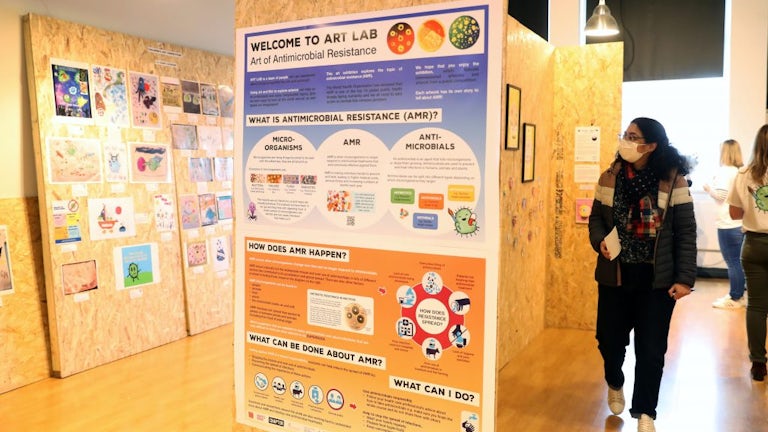
Our community projects
We use our wide range of expertise to support and deliver impactful community led projects alongside student and staff volunteers.



